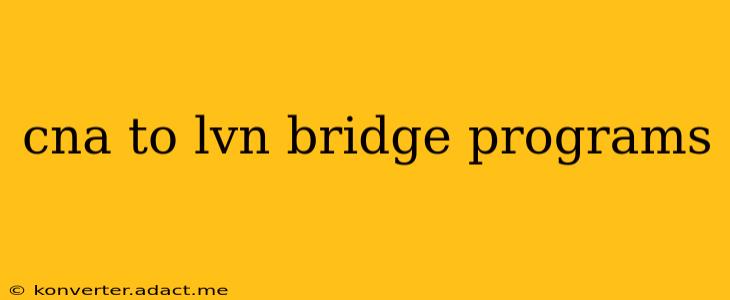Becoming a Licensed Vocational Nurse (LVN) is a significant step up in your nursing career, offering increased responsibilities, higher earning potential, and more diverse career options. If you're already a Certified Nursing Assistant (CNA), you've gained valuable hands-on experience and a solid foundation. Many schools offer CNA to LVN bridge programs, designed to expedite your transition and leverage your existing skills. This guide will explore these programs, answering common questions and helping you navigate the path to becoming an LVN.
What is a CNA to LVN Bridge Program?
A CNA to LVN bridge program is an accelerated educational pathway specifically designed for CNAs. These programs recognize your existing knowledge and experience, allowing you to focus on the advanced skills and theoretical knowledge required to become an LVN. Instead of repeating foundational coursework already covered in your CNA training, bridge programs concentrate on the additional curriculum needed to meet LVN licensing requirements. This typically results in a shorter program duration compared to traditional LVN programs.
What are the Benefits of a CNA to LVN Bridge Program?
Several key benefits make bridge programs an attractive option for CNAs:
- Shorter Program Length: Because you already possess fundamental nursing skills, the program is shorter than a traditional LVN program, saving you time and money.
- Cost-Effectiveness: The reduced program length translates to lower overall tuition costs compared to starting from scratch.
- Faster Career Advancement: You can achieve your LVN license and start earning a higher salary much sooner.
- Building Upon Existing Skills: The program reinforces your existing skills and allows you to build upon your practical experience.
- Increased Job Opportunities: An LVN license opens doors to a wider range of job opportunities and career advancement possibilities.
What are the Admission Requirements for CNA to LVN Bridge Programs?
Admission requirements vary between schools and states, but generally include:
- Valid CNA Certification: You must hold a current, active CNA certification in good standing.
- High School Diploma or GED: Most programs require a high school diploma or its equivalent.
- Minimum GPA: Some programs may require a minimum GPA from your previous education.
- Background Check and Drug Screening: These are standard requirements for healthcare programs.
- CPR Certification: Current CPR certification is usually a prerequisite.
- TEAS or Other Entrance Exams: Many programs require applicants to take the Test of Essential Academic Skills (TEAS) or a similar entrance exam.
What Courses are Typically Included in a CNA to LVN Bridge Program?
While the specific curriculum varies by institution, common courses include:
- Pharmacology: Administering medications safely and effectively.
- Medical-Surgical Nursing: Care for patients with various medical conditions.
- Maternal-Newborn Nursing: Care for pregnant women and newborns.
- Pediatric Nursing: Care for children.
- Geriatric Nursing: Care for elderly patients.
- Mental Health Nursing: Providing care for individuals with mental health conditions.
How Long Does a CNA to LVN Bridge Program Take?
The duration of a CNA to LVN bridge program varies, typically ranging from 6 months to 2 years, significantly shorter than the time it takes to complete a full LVN program. Program length depends on factors like the school's structure, course intensity, and the number of credits transferred from your CNA training.
How Much Does a CNA to LVN Bridge Program Cost?
Tuition costs differ widely depending on the institution, location, and program length. It's crucial to research and compare program costs before applying. Financial aid options such as grants, scholarships, and loans are often available to help offset tuition expenses.
What is the NCLEX-PN Exam?
After completing your CNA to LVN bridge program, you'll need to pass the National Council Licensure Examination for Practical Nurses (NCLEX-PN) to obtain your LVN license. The NCLEX-PN is a standardized exam that assesses your knowledge and skills as an LVN. Adequate preparation is crucial for success on this exam.
Are CNA to LVN Bridge Programs Worth It?
For CNAs with a strong desire to advance their careers and build upon their experience, a CNA to LVN bridge program offers an efficient and cost-effective route to becoming an LVN. The accelerated nature of the program allows for faster career advancement and a quicker return on investment. However, it's essential to carefully weigh the program requirements, cost, and time commitment to ensure it aligns with your individual circumstances and career goals.
By carefully considering the information provided in this guide, you can make an informed decision about whether a CNA to LVN bridge program is the right path for you. Remember to research different programs, compare costs and requirements, and choose the option that best suits your needs and aspirations.
